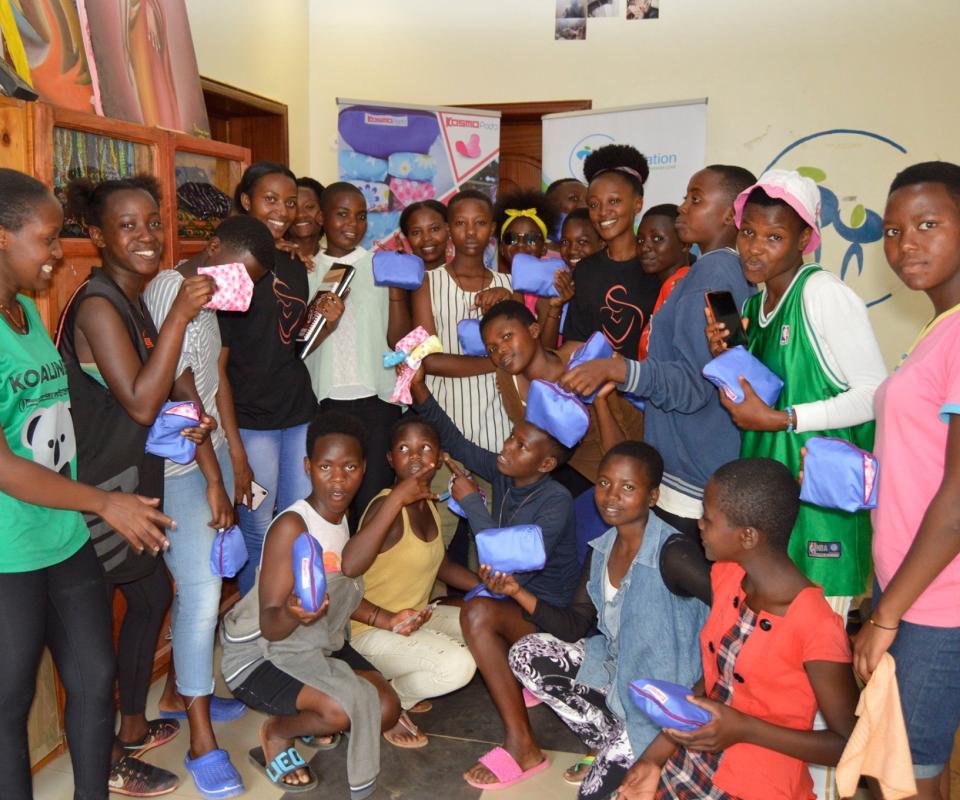Kosmotive: improving girls’ and women’s health in Rwanda
A 200,000 euro grant from the Business Partnership Facility (BPF), managed by the King Baudouin Foundation, has dramatically boosted a young entrepreneur’s aim of radically improving the lives of girls and women in Rwanda.
Young entrepreneur Blandine Umuzranenge says the money will help achieve her target by the end of 2023 of employing 100 young women producing eco-friendly, reusable, and hygienic sanitary pads for all Rwandan women, and not just the least advantaged. She applied for support from the Business Partnership Facility (BPF), which supports enterprise projects contributing to Sustainable Development Goals (SDGs) in developing countries.
Access to health information, products and services
The ‘KosmoPads’ project, which won the grant, started in 2019 and was Blandine’s most recent expansion since her 2014 launch of ‘Kosmotive’, a social enterprise with a mission to improve reproductive, maternal and child health in Rwanda and eventually across Africa, with better access to health services for mothers and children.
Under the Kosmotive name she has created Kosmos, a print and online magazine offering maternal health and lifestyle information to young women and mothers; a KosmoHealth app and helpline, which locates urgent care or home health services for pregnant women; and the Kadablah Collection, her own range of ecological clothing, shoes and accessories for pregnant women and new mothers.
The magazine gave Blandine her first platform for writing about the parent-child relationship in general, and to promote maternal help and advice centres. But she quickly became focused on the challenge for many girls and women of finding affordable, quality menstrual products. She was particularly saddened that girls from poor households routinely had to improvise menstrual pads from old clothes.
“I researched statistics and found that 18% of Rwandan girls and women could not afford menstrual pads. That’s one in five girls and women missing school or work because of their periods: it was an economic as well as a social and health issue.
“So I asked myself, when is someone going to change the system? For me, it was mostly about refusing to accept that it was normal to miss school or work when having a period.”
Blandine started investigating making reusable pads – virtually unknown in Rwanda then – which would be practical, cheaper, and sustainable.
“Reusable pads were hardly known in Rwanda then, and they are still not common. “But as I was already involved in textiles and making and selling clothes, I researched materials to make menstrual pads which would last longer, be affordable, environmentally sustainable and which would remove the stigma of periods.”
She sourced quality materials and began by making 20 high-grade pads a day – pads that are reusable for two years and even then do not need to be thrown away:
“After two years customers can return their old pads and receive a new pack for half price, and the fabric of the used pads is shredded and sold to furniture makers for stuffing. So they really are eco-friendly.”
Jobs creation
Blandine’s determination to provide an essential product for disadvantaged women has another big social benefit: the creation of one hundred jobs for young women by the end of 2023.
Her first team was just three workers in Kigali, the Rwandan capital. By the end of 2022 she was employing 27 production-line staff, increasing her daily output to 5,000 menstrual pads. The BPF support will help her meet that 2023 production line goal of 100 employees making KosmoPads.
Before Kosmotive, Blandine, with a background in maths, science, IT and business communications, had no shortage of potential careers and had landed an IT programming and networking internship.
”I didn’t think what I was doing had meaning or purpose. I just wanted to do something that would be a passion, something I would want to keep on doing even if I was not earning money”.
And that something is Kosmotive.

“So I asked myself, when is someone going to change the system? For me, it was mostly about refusing to accept that it was normal to miss school or work when having a period.”
Blandine

